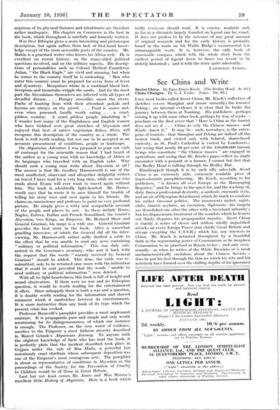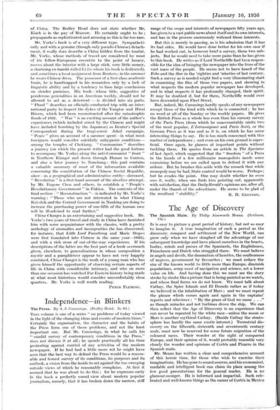See China and Write
Secret China. By Egon Erwin Kisch. (Tho Bodley Head. 8s. 6d.) China Changes. By G. J. Yorke. (Cape. 10s. 6d.) LIKE most books called Secret China, Mr. Kisch's collection of sketches covers Shanghai and (more cursorily) the remoter Peking ; on internal evidence it is clear that he broke the journey between them at Nanking. His publishers—perhaps mixing it up with some other book, perhaps by way of a joke— proclaim on the dust cover that " Here is China as the tourist does not see it . China as only the Chinese masses—and Kisch—know it." It may be—such, nowadays, is the enter- prise of tourists—that Shanghai and Peking are indeed off the beaten track, and visited only with belated, shamefaced curiosity, as St. Paul's Cathedral is visited by Londoners ; but seeing that nearly 80 per cent. of the 450,000,000 human beings who constitute " the Chinese masses " are engaged in agriculture, and seeing that Mr. Kisch's pages reflect no single encounter with a peasant or a farmer, I cannot but feel that the Bodley Head is talking through the Bodley Hat.
Handicapped though it is by such silly sales-talk, Secret China is an extremely able, extremely readable piece of impressionistic pamphleteering. Mr. Kisch, according to his publishers, " is known all over Europe as the Rampaging Reporter," and he brings to the quest for, and the washing of, dirty linen a professional dexterity, a sardonic, cinematic style, and an air of Olympian detachment which do much to condone his rather tiresome politics. The armaments racket, night- clubs, lunatic asylums, an execution, diplomats—his targets are demolished one after the other with a trenchant urbanity ; but his dispassionate treatment of the scandals which he ferrets out thinly disguises his propagandist impulse. Secret China is mainly a series of clever and seldom wholly unjustified attacks on every foreign Power (but chiefly Great Britain and always excepting the U.S.S.R.) which has any interests in China. Mr. Kisch is actuated throughout by a beautiful faith in the regenerating power of Communism as he imagines Communism to be practised in Russia today ; and only occa- sionally—as when he writes of the White Russians or is most uncharacteristically credulous about the Chinese Soviets— does he put his foot through the thin ice which his wits and his notebook have formed over the chilling depths of his ignorance of China. The Bodley Head does not state whether Mr. Kisch is in the pay of Moscow. He certainly ought to be ; propaganda as sophisticated and amusing as this is far too rare.
Mr. Yorke's book is of a very different type. Sympatheti- cally and with a genuine (though only pseudo-Chinese) detach- ment, it really does describe a China hidden from the tourist. Mr. Yorke, whose methods of travel are considered by most of his fellow-Europeans eccentric to the point of lunacy, moves about the interior with a large stick, very little money, a charming ex-bandit called Li (to whom his book is dedicated), and sometimes a local assignment from Reuters ; in the summer he wears Chinese dress. The possessor of a first-class academic brain, he is handicapped in his researches only by a lack of linguistic ability and by a tendency to base large conclusions on slender premises. His book—whose title, suggestive of ponderous generalities in an American weekly, should not be allowed to act as a deterrent — is divided into six parts. " Flood " describes an officially-conducted trip with an inter- national party to inspect the dykes of the Yangtse and Hwai Rivers, which had been reconstructed after the catastrophic floods of 1931. " War " is an exciting account of the author's experiences (which included arrest by the Chinese and might have included bombing by the Japanese) as Reuter's Special Correspondent during the tragi-comic Jehol campaign. " Peace " gives an account of a summer spent—in what most foreigners would consider suicidally unhygienic conditions— among the temples of Chekiang. " Communism " describes a journey (on which the present writer had the good fortune to accompany Mr. Yorke) along the anti-Communist " front " in Northern Kiangsi and down through Hunan to Canton, and also a later journey to Nanchang ; this part contains a valuable summary of most of the information available concerning the constitution of the Chinese Soviet Republic, since—as a geographical and administrative entity—deceased. " Revolution " is a first-hand account of the abortive attempt, by Mr. Eugene Chen and others, to establish a " People's Revolutionary Government " in Fukien. The contents of the final section—" Reconstruction "—is indicated by Mr. Yorke's warning : " Those who are not interested in what Chiang Kai-shih and the Central Government in Nanking are doing to increase the purchasing power of one-fifth of the human race will be ill-advised to read further."
China Changes is an entertaining and suggestive book. Mr. Yorke's two years of travel and study in China have furnished him with some acquaintance with the classics, with a pretty anthology of anomalies and incongruities (he has discovered, for instance, that Little Lord Fauntleroy and Marie Stopes were first translated into Chinese in the same year-1933), and with a rich store of out-of-the-way experiences. If his descriptions of the latter are the best part of a book overmuch given, elsewhere, to generalisations in whose composition a mystic and a pamphleteer appear to have not very happily combined, China Changes is the work of a young man who has given himself the opportunity of observing certain aspects of life in China with considerable intimacy, and who on more than one occasion has watched Far Eastern history being made at what most historians would consider uncomfortably close quarters. Mr. Yorke is well worth reading.
PETER FLEMING.











































 Previous page
Previous page